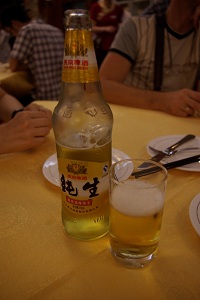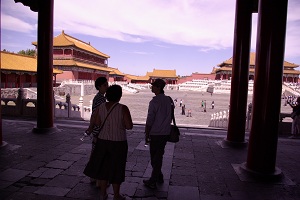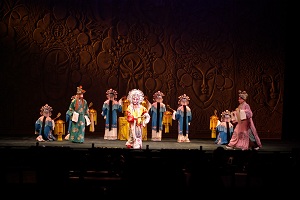I would like to welcome my first guest blogger, Andrew. He has recently visited China, a place that is on my list of where I’d like to wander. He writes about the fun and games of not speaking the local language, which I can relate to after working in Taiwan. Enjoy…
Like Beck Wanderer, I like to travel and experience the world through trying things that are new to me, but very much the reality of life in the country’s we visit. One thing that I have always carried with me in travelling is the importance of language, and ensuring you have enough of the local lingo to survive launching yourself in to a new culture. Now being English the stereotype is that we basically just shout a little, gesture to what we want and throw in a little local pleasantry at the end; for example:
“Hey Senor… TWO (showing two fingers) BEERS (Showing drinking action) POR FAVOR!! (Thumbs up)”
However, I find that when travelling, it is important to have at least the rudimentary pleasantries (Yes, No, Please, Thank you, hello, good bye), as well as at least three or four key phrases to both help you feel comfortable and ensure you have no little mishaps – How much is this? Where is the toilet? And crucially as above, Two beers please!
On a recent trip to China, however, this idea was tested somewhat as I travelled with a mixed group of language speakers… namely my wife and her parents. For those who don’t know me, my wife is Russian and speaks Russian and English fluently. But, my in-laws are very much old school Russian when it comes to language, with the added exception that my father-in-law speaks Chinese [Mandarin] due to his career, but as with me and Russian, they only speak the needed pleasantries and a few phrases of basic English.
So, after a week in Russia with family and my pigeon Russian, we travelled together to Beijing. I had tried to learn some basic Chinese [Mandarin] beforehand with the help of my father in-law, but this time I had gone against my own advice and cheated. since I was safe in the knowledge I had hired an English speaking guide, who my wife was prepared to translate into Russian for her parents as we visited the famous sights, Great Wall – Forbidden City etc. so they didn’t miss out on the history and stories of old China. A Chinese man speaking English and my wife translating it into Russian, simple…
Or so I thought… Our English speaking guide was shy and quiet ,and what information he did give was brief and to the point and once translated in to Russian not enough to quench the thirst of my history loving in-laws. Queue my father-in-law and his Chinese [Mandarin] language skills and basically an about turn in translation. So now it was going, Chinese to Russian, Russian to English and when questions arose back round again. Tiring! What I had learnt drifted into insignificance except at breakfast when our waiters enjoyed my Chinese pleasantries.
But after a while it seemed that we got more information by letting my father in-law speak Chinese [Mandarin] as the guide felt more comfortable speaking his own language and gave better direction when needed. So for all the trouble/expense I had gone to this time in getting an English guide, knowing the local lingo actually paid off for this group of travellers.
So do you live by this notion, that knowing some of the local language pays off more than knowing none at all or do you survive with raised voice and hand gestures? When in Rome and all that?
What other tips can you give fellow travellers like Beck and myself that you use every time when adapting and experiencing new cultures, we’d love to know?
Author: Andrew E Coulson lives in Adelaide and works in local government






 #3 Guest:Travelling with In-Laws – Problems Faced
#3 Guest:Travelling with In-Laws – Problems Faced #2 Guest: Better the devil – Tasmania’s Wild West
#2 Guest: Better the devil – Tasmania’s Wild West
Thanks Andrew for the great article and being my 1st guest blogger :o) The hand gestures made me smile. I always try to learn at least “hello”, “good bye” and “thankyou”. Though in Nepal the locals don’t use thank you, so when us foreigners say dhanybad they find us quite funny :o)